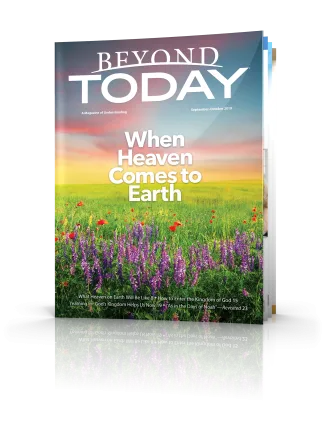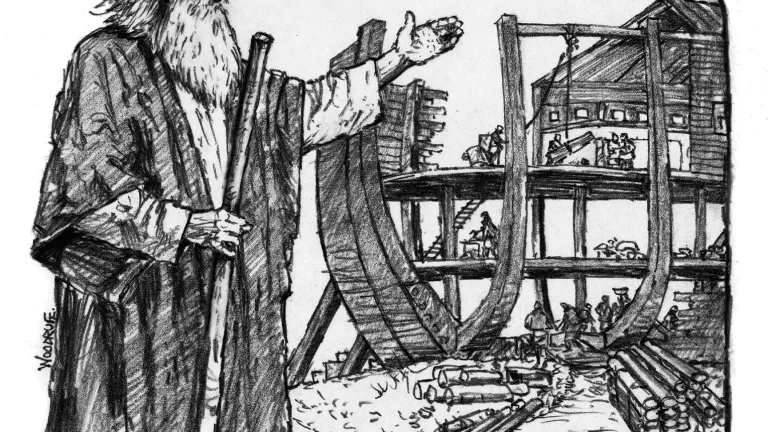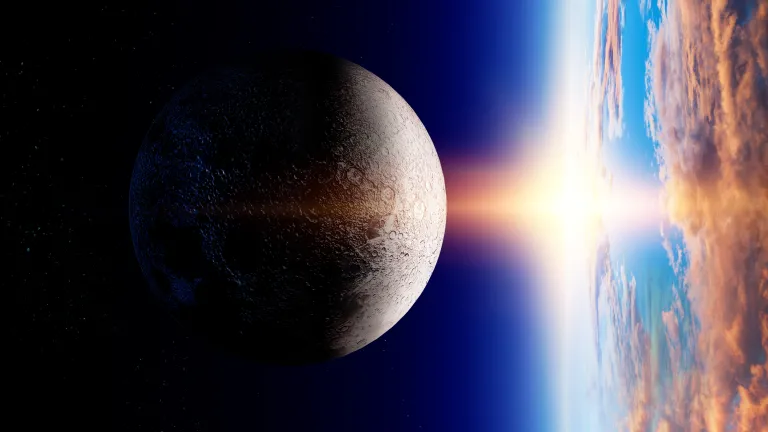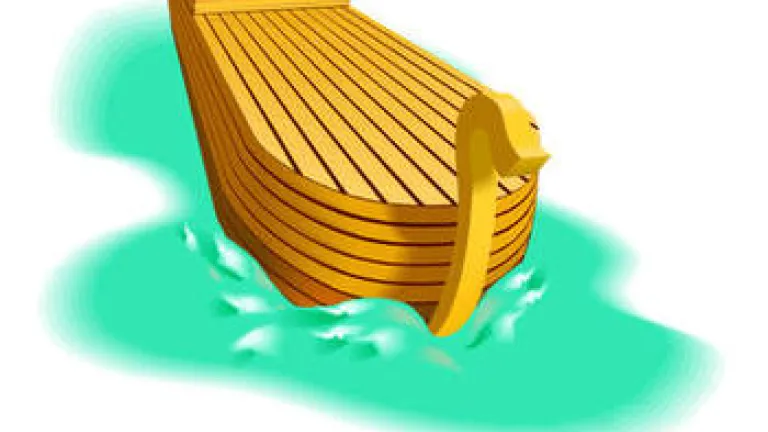“As in the Days of Noah”—Revisited

What if today’s culture is like that of the time before the Flood of Noah described in Genesis? What if God’s judgment and intervention are once again drawing near, with great impact on your life and family? Would you be prepared?
Recently I took my grandchildren to visit the Ark Encounter attraction, a full-scale recreation of Noah’s Ark in northern Kentucky. It was a memorable experience and a sobering reminder that today’s world is much like that of Noah’s time.
The ark was the ship God told Noah to build to save people from the judgment He would bring on the world for its sin. An evangelical ministry has built this replica as part of its outreach to show that the Bible is true. Having been built according to the dimensions given in Genesis 6, the attraction is claimed to be the largest freestanding timber-frame structure in the world today, and I don’t doubt it.
The craftsmanship is amazing. What this group has done with its interpretation of this ancient structure and how it would have functioned with people and animals on board is truly remarkable. I gained a deeper understanding of the technological state of the pre-Flood world of Noah. That world was evidently far more advanced than our modern perceptions give credit. Maintaining animal and human life within the ark over the course of the Flood is shown to be possible despite the logistical challenges.
This visit led me to think a lot more about the story of Noah and the Flood that God brought on the world of his day. It impressed on me more deeply that all the issues of Noah’s age are still headline issues of great importance today. Let’s review some of what the Bible says about this and what it means for us now.
A world of continual evil
In Genesis 6 we see a grim picture of the state of the world: “Then the Lord saw that the wickedness of man was great in the earth, and that every intent of the thoughts of his heart was only evil continually. And the Lord was sorry that He had made man on the earth, and He was grieved in His heart. So the Lord said, ‘I will destroy man whom I have created from the face of the earth, both man and beast, creeping thing and birds of the air, for I am sorry that I have made them.’
“. . . The earth also was corrupt before God, and the earth was filled with violence. So God looked upon the earth, and indeed it was corrupt; for all flesh had corrupted their way on the earth. And God said to Noah, ‘The end of all flesh has come before Me, for the earth is filled with violence through them; and behold, I will destroy them with the earth’” (Genesis 6:5-7, Genesis 6:11-13).
Again, it is a grim scene—a time of total violence and evil stemming from mankind’s relentless drive to reject God. It appears from the verses preceding this that the corrupted morals threatened the divine intent God planned for human beings created in His image.
In the midst of this corrupt society one man found favor, or grace, in the sight of God—Noah.
Noah was given instructions to build the ark, a great boat of enormous dimensions. It would serve as the vehicle to preserve life from the great Flood that God would send to destroy the world, a world filled with people who had lost all moral bearings and would not change their behavior.
In Genesis 6:3 we are told that when Noah was given this task, 120 years remained for the people of that day. In those years Noah constructed the ark and warned his generation of the calamity to come. Noah is described as a “preacher of righteousness” in 2 Peter 2:5. Part of his work was to show the people of his world their sin and to warn of God’s judgment. They could escape what was coming through repentance. But in the end, only Noah, his wife and their three sons and their wives were saved—just eight people.
Through Noah—his work of building a huge boat and his preaching of God’s righteousness—God was giving the world an opportunity to repent, change and acknowledge Him as Creator. The work Noah did for 120 years was an example of God using human instruments to teach, warn and urge human beings to acknowledge their dependence on Him.
A multigenerational work
You can imagine the message of Noah traveling far. People told the story of a man warning about a catastrophe coming on the earth. He said that if they did not repent of their ways, all people would face the judgment of God. The problem of that generation was much like ours today—people did not believe there would come a time of judgment for their actions.
Noah, of all the people on the face of the earth, had been called by God to understand the times and what lay ahead for mankind. He did what God told him to do and began building. People heard his preaching and were drawn to the project by curiosity if nothing else.
Consider that during this 120 years, at least several generations of people had direct contact with this work under Noah. It was a huge project bringing in people from many regions. Materials would have been gathered from far-flung areas and transported to the ark’s building site.
Perhaps dozens or even hundreds of people were employed at various times on the project. Whole families and communities may have grown and developed around this gigantic ship. Children grew up, married and raised their own children in its shadow. No doubt craftsmen from afar heard about a giant boat being built and traveled to the site to see what this was all about and to perhaps ply their trade.
How many came to the site wanting to be part of something bigger than their lives? Did any catch a vision of what was behind the boat? Did any believe Noah’s message?
Did some even believe the message of the coming Flood only to eventually abandon their belief? Perhaps some came to reason: “There will be no Flood. Life and this world will go on just as they always have. The idea of the depths of the earth erupting and water pouring down for weeks is absurd. It’s never happened, so why should we think it will happen now?”
The apostle Peter rebukes the thinking of those who imagine the world will just keep going on as usual, pointing out that they willfully forget the lesson of Noah’s Flood and warning that judgment is indeed coming. Peter explains that the reason for apparent delay is that God wants to give people time to trust Him and repent (2 Peter 3:1-9). God wants to save people—but they need to take Him at His word and hold fast to that.
Noah’s work was one of faith. Notice how it is described in Hebrews 11:7: “By faith Noah, being divinely warned of things not yet seen, moved with godly fear, prepared an ark for the saving of his household, by which he condemned the world and became heir of the righteousness which is according to faith.”
Jesus Christ confirms the story
For us today, a critical reason to study the story of Noah is what Jesus Christ said about it. In Matthew 24, where Jesus gave specific signs that would precede His second coming, He brought Noah’s time into the 21st century with stunning clarity:
“But of that day and hour no one knows, not even the angels of heaven, but My Father only. But as the days of Noah were, so also will the coming of the Son of Man be. For as in the days before the flood, they were eating and drinking, marrying and giving in marriage, until the day Noah entered the ark, and did not know until the flood came and took them all away, so also will the coming of the Son of Man be” (Matthew 24:36-39).
People did not believe what Noah said about a coming judgment for sin. Today it’s the same. We go about life without a sense that sin has consequences or that God will bring a time of judgment because of mankind’s increasing rejection of God and His laws.
Have we reached such a point in our modern world?
To properly evaluate today’s world, we have to see it from God’s perspective. That can be sobering. Jesus is warning us today not to become so immersed in the present moment that we forget the Kingdom of God is nearly here. We must never become so preoccupied with our daily lives that we forget that life and death are in His hands. God has called us to prepare in advance for His Kingdom. That preparation should take place each day.
Christ continues: “Therefore keep watch, because you do not know on what day your Lord will come. But understand this: if the owner of the house had known at what time of night the thief was coming, he would have kept watch and would not have let his house be broken into. So you also must be ready, because the Son of Man will come at an hour when you do not expect him” (Matthew 24:42-44, New International Version).
How is this like today?
Society today is approaching a tipping point in human behavior from which there is no turning back. Corruption has reached unprecedented levels. Consider the recent mad rush by hundreds of state legislators to enshrine the legal right to murder unborn children. Just before I began writing this article, the state of Illinois joined New York and other states in enacting legislation effectively legalizing infanticide. America is creating a cultural catastrophe like that of Noah’s time when, as we read, “all flesh had corrupted their way on the earth.”
Are we really “corrupt” today? As I write this, it’s “LGBTQ Pride Month” in the United States and other countries. My email inbox is a barrage of messages from many of America’s most notable companies celebrating homosexuality, bisexuality and transgenderism. Such issues, along with rampant adultery and premarital sex, are upending the divine order of the sexes and morality. We can’t even define something as simple as male and female anymore, much less right from wrong!
The prophet Isaiah wrote: “Woe to those who call evil good, and good evil; who put darkness for light, and light for darkness” (Isaiah 5:20). The pace of change away from what is good is dramatic, sweeping over our country and even the whole world like a storm—and the consequences are indeed frightening.
And we are like Noah’s time in another major way. God has been removed from the public square. We do not want to obey God or admit discussion about God and His law into public discourse over the major issues of the day that plague and divide us. That would be considered regressive and promoting of bigotry and even “hate speech.” People do not understand the concept of biblical sin. There is little or no fear of judgment for sin—and disdain for anyone who would suggest it.
We who produce Beyond Today magazine and TV are challenged to address all this. So much that is so wrong is being accepted and even celebrated more and more every day. We cannot but help find ourselves thinking, yes—we really are living in a time like the days of Noah!
Unparalleled judgment for unparalleled corruption
When human beings corrupted life on earth to a degree that it was no longer salvageable at that time, God brought destruction to the world. Yet through Noah He preserved the human race and other life on earth. God’s action was a remarkable combination of grace, judgment and purpose. Noah’s righteous life, as the focus of God’s attention and favor, provided a means for safety and salvation for humankind. The perfect plan of God called for judgment for sin, which at that time had led to a level of corruption from which there was no turning back.
Think for a moment about that last statement. I realize it’s strong, but we must understand the depth of human depravity that led to this event.
Human behavior could not be redeemed as things were, so a time of judgment came in order to rescue mankind. That is what the biblical account tells us.
This is a sobering message that in this time falls on us at Beyond Today to give to you. We are moved to carry out a work today that, like Noah’s, is not popular or easy. But God gave the message. We are commissioned to proclaim it. Will you be moved to respond in a godly manner as Noah did?
Consider one more thing.
The account in Genesis says, “Then the Lord saw that the wickedness of man was great in the earth . . .” (Genesis 6:5). God’s perspective on the world is what matters—not ours. As it was then, so it is now: It’s what God sees that’s critical. God looks at human behavior according to how He intended people to behave when He made us. He defines righteousness not by popular vote or opinion, but by His law. But He also shows mercy and forgives when there is a change in heart. Noah found grace in God’s sight amidst the appalling evil and violence of the day.
These impressions remain with me following my visit to the replica of Noah’s ark. Our time mirrors that of Noah. It’s a perilous time (see 2 Timothy 3:1). A day of judgment is coming. We should consider how we live. Do we fear God? Would our lives find “grace” in God’s sight? I’ve asked myself: Would I be among only a handful of people God saves from the destruction of our modern civilization? Do I have what God is looking for? Do you?







